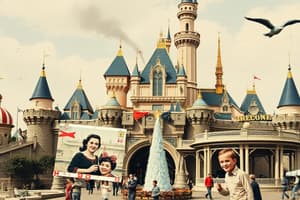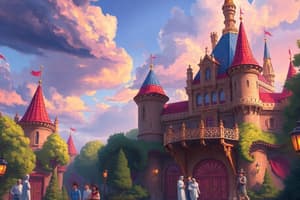Podcast
Questions and Answers
According to the International Association of Amusement Parks and Attractions (IAAPA), what is the definition of a theme park?
According to the International Association of Amusement Parks and Attractions (IAAPA), what is the definition of a theme park?
- An amusement park with themed attractions including food, costumes, entertainment, and rides (correct)
- An amusement park with a variety of thrill rides and shows
- An amusement park with large roller coasters and water rides
- An amusement park with a focus on historical and cultural exhibits
How does Forrec define a theme park?
How does Forrec define a theme park?
- A place of escape from everyday burdens with themed attractions (correct)
- A park with a variety of natural landscapes and wildlife attractions
- An entertainment complex with a focus on extreme sports
- A place for educational experiences and historical reenactments
According to Pearce (1988), what are theme parks considered to be?
According to Pearce (1988), what are theme parks considered to be?
- Primarily educational and research-oriented environments
- Simple, natural, untouched recreational spaces
- Minimally developed, low-cost, natural recreational areas
- Capital intensive, highly developed, user-oriented, man modified, recreational environments (correct)
What is the main purpose of selecting a theme for a theme park according to the text?
What is the main purpose of selecting a theme for a theme park according to the text?
What is the common attribute shared among different definitions of theme parks as per Heo (2009)?
What is the common attribute shared among different definitions of theme parks as per Heo (2009)?
Flashcards are hidden until you start studying
Study Notes
Defining Theme Parks
- The International Association of Amusement Parks and Attractions (IAAPA) defines a theme park as having themed attractions, food, costumes, entertainment, retail stores, and rides.
- Forrec describes theme parks as places of escape, providing a break from everyday burdens.
- According to Heo (2009), academic definitions of theme parks include themed attractions, architecture, landscape, rides, shows, foodservices, costumed personnel, and retail shops.
- Pearce (1988) characterizes theme parks as capital intensive, highly developed, user-oriented, man-modified, recreational environments.
- Despite varying definitions, a common attribute of theme parks is the application of themes to provide visitors with unique experiences different from daily life (Heo, 2009).
- The selection of the theme is crucial in the design, development, and operation of a theme park, as it serves as the focal point for the visitor experience.
- Theme parks are classified based on the chosen theme, which influences the design, development, and operation of the park.
- The theme is central to visitors' experiences, guiding the overall atmosphere and attractions of the park.
- Themed attractions, food, costumes, entertainment, and retail stores are all integral components of a theme park experience.
- Theme parks are designed to offer visitors an escape from their daily lives, providing them with an opportunity for unique and interesting experiences.
- The theme of a park shapes its entire operation, from the design of attractions to the overall atmosphere.
- Academic and industry definitions of theme parks emphasize the importance of themes in providing visitors with a distinct and immersive experience.
Studying That Suits You
Use AI to generate personalized quizzes and flashcards to suit your learning preferences.




